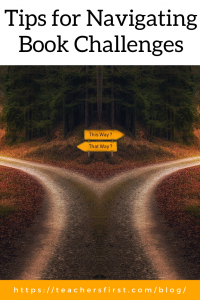The challenging of books based on their content has a long history, but they have been a major news story this school year. The challenges are coming from a variety of sources—parents, school committees, politicians, community groups, and others. There are a variety of reasons for the discussion, but what do you do when books are being challenged in your school library?
School libraries have long been advocates in the fight against book banning. School libraries nationwide celebrate Banned Books Week in the fall and participate in activities like the Dear Banned Author project. School Librarians across the country are currently facing book challenges. The National Education Association (NEA) and the American Library Association (ALA) have both issued statements with helpful information. ALA tracks the top ten banned books every year. You can also access book challenge resources compiled by the ALA and the National Coalition Against Censorship (NCAC). As always, the best offense in the fight against book challenges is a prepared defense. A proactive approach where you’re prepared before a book challenge happens in your school library always helps. All school libraries should have a book challenge policy and plan.
Book challenge plans are your offense! What does that look like? One of your first steps if a book is challenged in your school library should be to report the challenge using the new School Library Journal Censorship Tips Hotline form or this form from ALA (or both!). Both organizations are tracking book challenges nationwide. You should also have a form letter ready to send to the complainant, as well as a required complaint form for them to fill out. Gather your community advocates to prepare for any public meetings that may be held. Do your research before attending any public meetings or defending your school library’s book choices. Researching any challenges that have been mounted in your district or your state, prior national book challenges, and student rights may help. Your library’s collection development policy will also be helpful and should be current. There are organizations available for help like ALA (challenge support materials), the NCAC crisis hotline, and the Comic Book Legal Defense Fund (support for defending graphic novels). Get your students involved if possible—students can be great advocates, as evidenced by our headline video!
Book challenges can be difficult to handle, but know that you are not alone! Reach out to your fellow librarians for support. We’re all in this together!


